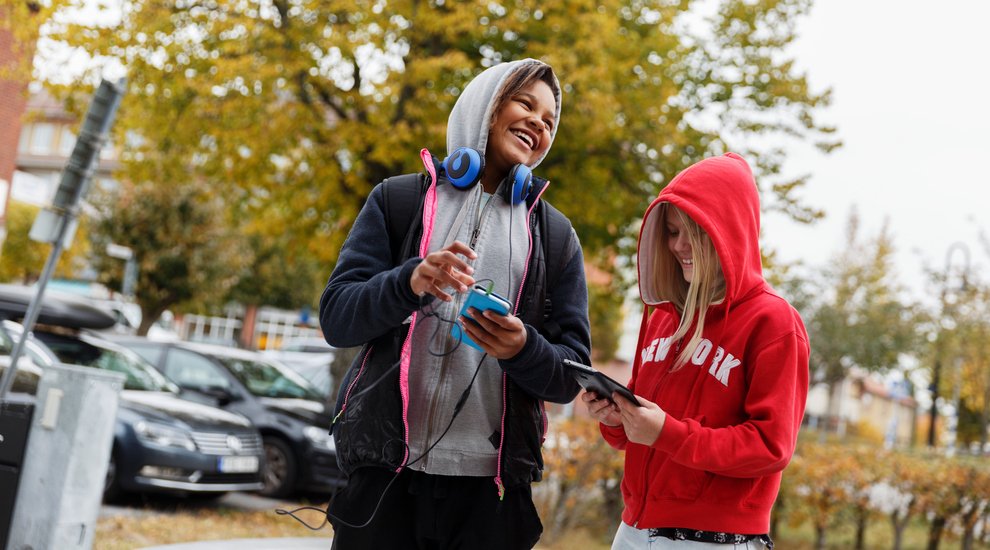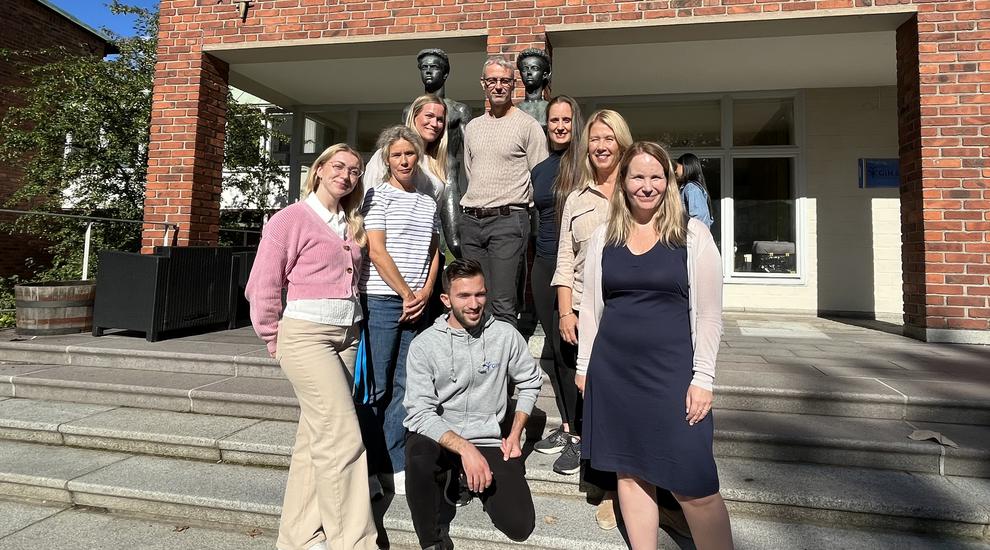School project for brain health - A school-based intervention to improve mental health, cognitive function, academic performance in adolescents
Project Leader
- Gisela Nyberg
Department
- Department of Physical Activity and Health
Research Funders
- Knowledge Foundation
- Skandias Stiftelse Idéer för livet
- The Kamprad Family Foundation
- Swedish ESF Council (Council of the European Social Fund in Sweden)
Abstract
Below you can read summaries about the project in English and/or Swedish. The information is taken from the publication database DiVA.
There has been an increase in self-reported mental health problems in recent years. Also, the majority of adolescents do not reach the physical activity recommendation. In parallel, there is great variation in health, reading and academic performance depending on socioeconomic background. The aim of this study is to develop a universal, collaborative, multi-component intervention and evaluate effects on mental and physical health, cognitive function and academic performance. Also, to provide schools with effective strategies on how to sustainably support healthy brain functions and academic performance in adolescents.
There will be 2 sub-studies: 1) To study the effects of a cluster-randomised school-based intervention. Fifty schools with boys and girls in grade 8 will be invited. The intervention will be performed during an extended school day, 60 minutes three times per week, during one school year and include: a) physical activities, b) homework support with activity breaks and c) walking and listening to audiobooks, 2) To conduct a process evaluation including intervention dose, fidelity, feasibility, acceptability and a description of the context to elucidate facilitating and hindering factors.
Physical activity will be measured by accelerometry, cognitive functions by a computer-based test battery, mental health with questionnaires and academic performance by grades. Effectiveness regarding outcomes between groups will be analysed by mixed effect regression analysis, adjusted for relevant covariates. Qualitative data will be analysed with content analysis.
This cluster-randomised controlled intervention has been conducted in a pilot study during the school year 2021/2022 including 192 adolescents aged 14-15 years from six schools around Stockholm with a variation in socioeconomic background. A second round started in September 2023. Thirteen schools around Stockholm, Sweden with around 400 adolescents in grade 8 are currently participating in the intervention during one school year (23/24). The third round will include schools in Småland and will start in the academic year of 2024/2025. The schools in the wait-list control group will be offered the intervention after the post-intervention measurements.
Increased mental health problems among adolescents require new strategies for preventive work. The results will be of great importance to inform the development of efficient future interventions in schools to promote mental health and facilitate learning in students.
The project is part of E-PABS – a center of Excellence in Physical Activity, healthy Brain functions and Sustainability.
Självrapporterade psykiska hälsoproblem har ökat bland svenska ungdomar samtidigt som majoriteten av dem inte når upp till rådande rekommendation om fysisk aktivitet. Det finns dessutom en stor variation i hälsa, läsförståelse och skolprestation beroende av socioekonomisk bakgrund.
Syftet med projektet är att utveckla och utvärdera om en intervention under en förlängd skoldag förbättrar psykisk och fysisk hälsa, kognition och skolprestation hos ungdomar. Projektet består av två delstudier som utvecklas i samarbete med skolpersonal, elever och kommuner.
I delstudie 1 studeras effekterna av en skolbaserad intervention på 50 skolor med 2700 ungdomar i årskurs 8 i Stockholm och Småland. Interventionen kommer att genomföras under tre skoldagar per vecka under ett läsår. Dessa skoldagar förlängs med 60 minuter och innehåller:
a) olika fysiska aktiviteter,
b) läxstöd med rörelsepaus och
c) promenera med ljudbokslyssning.
I delstudie 2 genomförs en processutvärdering av främjande och hindrande faktorer. Psykisk hälsa kommer att mätas med frågeformulär, fysisk aktivitet med rörelsemätare, kognition med ett datorbaserat testbatteri och skolprestation med betyg. Kvalitativa data samlas in genom fokusgrupper och intervjuer med studenter, lärare och rektorer.
Resultaten från detta nyskapande projekt kommer att vara av stor betydelse för att utveckla effektiva och hållbara framtida insatser i skolor för att främja en jämlik psykisk och fysisk hälsa och underlätta lärande hos elever.

Latest news from the project
Read news about the school project and watch the film about how young people can feel good and perform better in school.
Film about the project
This film is about how GIH can help young people to feel good and perform better in school. In the study, we at GIH evaluate an intervention that aims to improve mental health, cognition and school performance by increasing physical activity during an extended school day. Read more about the initiative below.
Data collection
The data collection in the study started in September 2023 in thirteen schools in the Stockholm area.
In the autumn of 2023, a total of 400 young people in grade 8 participated in the study's first measurements (baseline). The schoolchildren were asked to fill out questionnaires to measure mental health and health habits and completed a cognition test via computer. Weight and height were measured by the research team, and physical activity was recorded with motion sensors for seven days.
Five schools have been randomly assigned to participate in the intervention and the others are control schools. The intervention itself consists of three hours of extended school time per week during a school year, with the following activities:
- an hour of various physical activities, adapted to the wishes of the young people
- One hour of homework with movement breaks
- One Hour Walk with Audiobook
The schools participating in the intervention have started the various activities during the autumn term. Both students and teachers have been excited to get started. The research team will now be in the classes to find out how it is possible to implement the initiative and to support and inspire the teachers with suggestions for activities. For example, the researchers have made activity cards for the exercise breaks to make it easier for the teachers. The pupils have been given rain ponchos and headphones for the walks to make it easier for them to get started with the walks regardless of the weather.
Follow-up measurements in schools in the Stockholm area will take place in the spring of 2024 and 2025. There is also an ongoing recruitment of schools in Småland for data collection in more places in Sweden.

Frida Söderström, Louise Åberg, Linnea Bruhn, Örjan Ekblom, Frida Lindh, Gisela Nyberg, Björg Helgadottir. Panagiotis Danias.
Collaboration partners
The school project for brain health is carried out in collaboration with a number of partners.
We work with:
- Skandia
- IKEA
- CLAUSE
- Storytel
- Permobil
- Generation Pep/The Crown Princess Couple's Foundation
- Karolinska Institutet
- Linnaeus University
- The City of Stockholm's Sports and Education Administrations
E-PABS research environment
This project is part of the research environment E-PABS – a centre of excellence for physical activity, brain health and sustainability.
E-PABS has three main research themes, all of which focus on brain health:
- The Neurophysiology of Exercise
- Physical Activity Epidemiology
- Sustainable behavioural change
The school project for brain health belongs to the theme "Sustainable behavioural change".
Co-researcher
- Björg Helgadottir, GIH, Department of Physical Activity and Health
- Örjan Ekblom, GIH, Department of Physical Activity and Health
- Maria Ekblom, GIH, Department of Physical Activity and Health
- Frida Lindh, GIH, Department of Physical Activity and Health
- Linnea Bruhn, GIH, Department of Physical Activity and Health
- Frida Söderström, GIH, Department of Physical Activity and Health
- Louise Åberg, GIH, Department of Physical Activity and Health
- Pia Magnusson, GIH, Department of Physical Activity and Health
- Lisette Farias Vera, Karolinska institutet
- Marianna Moberg, Karolinska institutet
- Susanne Andermo, Karolinska institutet
- Josefin Westberg, GIH, Department of Physical Activity and Health
Funding period
- 2021 - 2025
Project type
- Project grant
National Research Field
- Public Health, Global Health, Social Medicine and Epidemiology
- Neurosciences
%20(2)%20SV-V-Medfinansieras-av-Europeiska-unionen_POS_POS.png)


